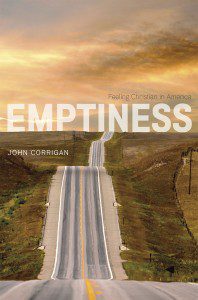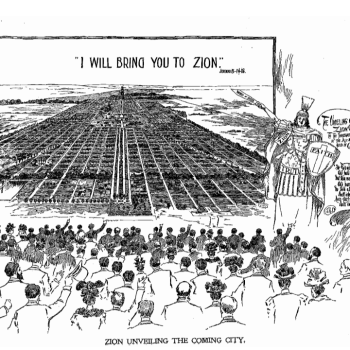In Paul’s letter to the church at Philippi, he includes what most scholars regard as an early Christian hymn. It praises Christ Jesus,
Who, though he was in the form of God,
did not regard equality with God as something to be exploited,
but emptied himself, taking the form of a slave,
being born in human likeness.
Jesus humbled himself and “became obedient to the point of death — even death on a cross.” Because Jesus made himself low, “God also highly exalted him.” Paul encourages his readers to “let the same mind be in you that was in Christ Jesus.” They should similarly humble themselves, and he implies that those who do will come to share in Christ’s glory.
In their attempt to imitate Jesus, Christian believers in many places and times have understood this passage as a command for followers of Jesus to empty themselves of fleshly desires, of selfishness, of the self entirely. They should make themselves empty vessels, in preparation for God to fill them with Christ or with the Spirit. Christians should “let go and let God.” They should completely surrender themselves to Christ in their quest for salvation and in preparation for service. “All to Jesus I surrender,” Judson Van de Venter wrote in a popular hymn, “Lord, I give myself to Thee; Fill me with Thy love and power, Let Thy blessing fall on me.”
John Corrigan, who has published widely on the intersection of emotion and religion in American history, explores the above themes in their American context. In Emptiness: Feeling Christian in America, Corrigan observes that the cultivation of emptiness has central to the creation of both individual and collective identities among American Christians.
 Corrigan’s examples are legion. Jonathan Edwards, for example, once wrote of glimpsing Christ’s ineffable glory during a walk in the woods taken for prayer and contemplation. Edwards wept aloud for an hour, leading to feel “emptied and annihilated, to be in the dust, and to be full of Christ alone.” In his longing to return to those feelings of fullness, Edwards regularly prayed that God would humble him: “I desire that God would… empty me entirely of myself.” Emptiness led to spiritual fullness.
Corrigan’s examples are legion. Jonathan Edwards, for example, once wrote of glimpsing Christ’s ineffable glory during a walk in the woods taken for prayer and contemplation. Edwards wept aloud for an hour, leading to feel “emptied and annihilated, to be in the dust, and to be full of Christ alone.” In his longing to return to those feelings of fullness, Edwards regularly prayed that God would humble him: “I desire that God would… empty me entirely of myself.” Emptiness led to spiritual fullness.
These ideas, themselves adapted from Edwards’s Puritan forebears, retained a strong currency among his diverse theological descendants. Corrigan, though, finds that nearly all expressions of American Christianity — Catholics, Mormons, and a wide variety of Protestants — tapped into the twin quest for emptiness and spiritual fullness. Christians should recognize the vanities of the world, the ineluctable speed of human time, their pitifully small place in an infinite universe. They should stand at the ocean’s edge and reckon with their mortality. Only through the cultivation of emptiness would they be prepared to be saved, to be filled, to be consecrated for service. “It was good to feel empty,” Corrigan observes, “and greater emptiness led to greater yearning. Greater yearning brought a person closer to God, so that to be empty was, at certain peak moments, to be full.”
Some traditions were more bent on the annihilation of the self than others, and Christians have had widely divergent ideas about what exactly the soul should be filled with following its emptying, and how. Nearly all have lauded prayer, especially secret, heartfelt prayer. Many have practiced fasting. Some even practiced bloodletting.
Corrigan’s book is full of insight on many related topics: philosophical debates between realism and varieties of nominalism; the often bitter construction of doctrinal and social boundaries; the use of “wilderness” and “desert” as justifications for settlement and conquest and as metaphors for the soul.
Reading Emptiness, though, was both moving and troubling. For a variety of reasons (perhaps just ego?), Christian language about the annihilation of the self has long troubled me. Didn’t God create those selves? Why then should we attempt to annihilate them? Yes, ask God to reduce our selfishness, but not to the point of annihilating God’s creation.
Moreover, the idea that women in particular should set aside their allegedly selfish goals and ambitions in service to others has often served as a justification for foreclosing their opportunities in church and society and for their submissive position within marriage and family. A disregard for self can be dangerous.
At the same time, the idea of self-emptying is rooted in Christian scripture and has a venerable place within theology and devotional writing. Jesus calls us to approach him as children, as those who hunger and thirst, as those who are meek. We are to be like the poor and generous widow, not like the rich man, and not just in terms of our material possessions.
Perhaps what is more troubling is that even when we hunger and thirst and humbly seek spiritual food, our hunger and thirst returns. “Whoever comes to me will never be hungry,” Jesus promises in the Gospel of John, “and whoever believes in me will never be thirsty.” Even for those who humble themselves and seek to empty themselves, they are at best — like Edwards in the woods — only quenched and filled for a short while. Our emptiness returns with a vengeance.
And that is true whether we cultivate emptiness or not. As I was reading John Corrigan’s Emptiness, I encountered Kate Bowler’s poignant essay in the New York Times. Bowler spent years studying the Prosperity Gospel. Her book Blessed is an incredibly penetrating study of that impulse within American Christianity.
Bowler writes about men and women who insist that regardless of their circumstances, they are blessed. They assert that their faith has the power to bring about their health and wealth. Bowler approaches the subjects of her book with a large measure of tenderness and sympathy, but she also makes trenchant criticisms of the prosperity gospel. In her New York Times essay, she explains:
The prosperity gospel has taken a religion based on the contemplation of a dying man and stripped it of its call to surrender all. Perhaps worse, it has replaced Christian faith with the most painful forms of certainty. The movement has perfected a rarefied form of America’s addiction to self-rule, which denies much of our humanity: our fragile bodies, our finitude, our need to stare down our deaths (at least once in a while) and be filled with dread and wonder. At some point, we must say to ourselves, I’m going to need to let go.
Bowler writes about the Stage IV cancer that has forced her to that point. “I have surrendered my favorite manifestoes about having it all,” she informs us, “managing work-life balance and maximizing my potential.”
Kate Bowler’s essay helped me formulate my thoughts about the cultivation of emptiness that Corrigan analyzes. Most human beings do not need to work hard to cultivate emptiness. We feel it not because we want to but because we have no other choice. We watch those we love die. Directly or indirectly, we are scarred by addiction, abuse, and a host of other ills. The world is not only a vale of tears, but it is surely that. As Kate Bowler writes, “Life is so beautiful. Life is so hard.”












